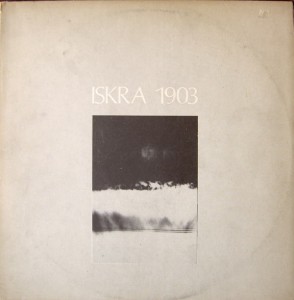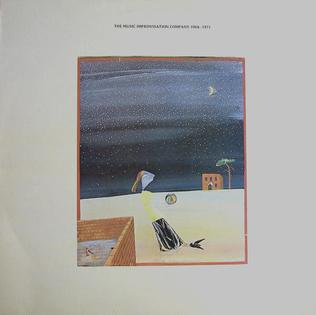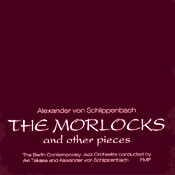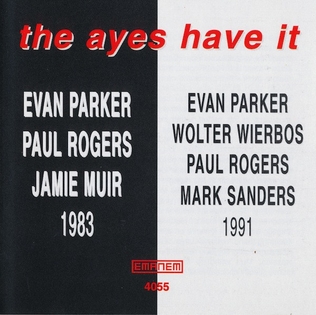
Derek Bailey was an English avant-garde guitarist and an important figure in the free improvisation movement. Bailey abandoned conventional performance techniques found in jazz, exploring atonality, noise, and whatever unusual sounds he could produce with the guitar. Much of his work was released on his own label Incus Records. In addition to solo work, Bailey collaborated frequently with other musicians and recorded with collectives such as Spontaneous Music Ensemble and Company.

The Spontaneous Music Ensemble (SME) was a loose collection of free improvising musicians, convened in 1965 by the now late South London-based jazz drummer/trumpeter John Stevens and alto and soprano saxophonist Trevor Watts. SME performances and recordings could range from Stevens–Watts duos to gatherings of more than a dozen players.

Evan Shaw Parker is a British tenor and soprano saxophone player who plays free improvisation.

Saxophone Solos is a solo soprano saxophone album by Evan Parker. Three of the tracks were recorded live on June 17, 1975, at the Unity Theatre in London, and the remaining music was recorded on September 9, 1975 at the FMP Studio in Berlin. The album was initially released on LP in 1976 by Incus Records, and was reissued on CD in 1995 by Chronoscope records with nine additional tracks bearing subtitles from Samuel Beckett, again on CD in 2009 by Psi Records, and again on LP in 2021 by Otoroku Records. The contents of the album, plus a previously-missing track from the studio session, were also included in a 1989 limited-edition box set compilation titled Collected Solos, issued by Cadillac Distribution.

The Snake Decides is a studio album by British jazz saxophonist Evan Parker. It was released in 1988 on Parker and Derek Bailey's Incus Records label, re-released on Parker's Psi label in 2003, and reissued again in remastered form with new liner notes by Brian Morton on the Otoroku label in 2018.

Barry John Guy is an English composer and double bass player. His range of interests encompasses early music, contemporary composition, jazz and improvisation, and he has worked with a wide variety of orchestras in the UK and Europe. He studied at the Guildhall School of Music under Buxton Orr, and later taught there.

The Topography of the Lungs is an album by saxophonist Evan Parker, guitarist Derek Bailey and percussionist Han Bennink recorded in London on 13 July, 1970 and became the first release on the Incus label. It is considered a milestone of the free improvisation genre.
The genre of solo saxophone has a rich, but largely unmapped history in contemporary music, particularly jazz. Many, but not all, musicians who play and record solo saxophone use extended techniques, a vocabulary of the saxophone beyond its normal range. Notable musicians in this field include Kaoru Abe, Anthony Braxton, Peter Brötzmann, John Butcher, Don Dietrich, Eric Dolphy, Brandon Evans, Paul Flaherty, Mats Gustafsson, Coleman Hawkins, Lee Konitz, Steve Lacy, Roscoe Mitchell, Evan Parker, Sonny Rollins, Sam Newsome, Ned Rothenberg, Masayoshi Urabe, Ken Vandermark, Colin Stetson, Jonah Parzen-Johnson and Andre Vida, Gianni Gebbia.

Drawn Inward is an album by the Evan Parker Electro-Acoustic Ensemble recorded in December 1998 and released on ECM the following year.

The Eleventh Hour is an album by British saxophonist and improvisor Evan Parker's Electro-Acoustic Ensemble recorded in November 2004 and released on ECM the following year.

Ode is an album by the London Jazz Composers' Orchestra composed by bassist Barry Guy and conducted by his teacher, Buxton Orr. It was recorded as part of the English Bach Festival at the Oxford Town Hall in 1972 and first released as a double album on the Incus label then as a double CD on Intakt in 1996 with additional material.

Iskra 1903 is the debut album by the group of the same name, featuring trombonist Paul Rutherford, guitarist Derek Bailey and bassist Barry Guy which was recorded at the Institute of Contemporary Arts in 1970 and in a studio in 1972 and first released as a double album on the Incus label then as a triple CD box set entitled Chapter One 1970-1972 on Emanem in 2000 with additional material.

The Music Improvisation Company 1968–1971 is an album by The Music Improvisation Company recorded over 1968 and 1970 and released on the Incus label in 1976. The quartet features saxophonist Evan Parker, guitarist Derek Bailey, Hugh Davies on various self-made electronic instruments, and percussionist Jamie Muir.

Song for Someone is the second album led by trumpeter and composer Kenny Wheeler which was recorded in 1973 and released on the Incus label. The album was rereleased on CD on Psi Records in 2004.

Atlanta is a live album by saxophonist Evan Parker. It was recorded in December 1986 in Atlanta, Georgia, and was released by Impetus Records in 1990. On the album, Parker is joined by bassist Barry Guy and drummer Paul Lytton.

Collective Calls (Urban) , subtitled "an improvised urban psychodrama in eight parts", is an album by saxophonist Evan Parker and drummer Paul Lytton. It was recorded in April 1972 at the Standard Essence Co, a small loft space in London, and was released later that year by Incus Records. The album was reissued on CD by Psi Records in 2002.

At the Unity Theatre is a live album by saxophonist Evan Parker and drummer Paul Lytton. It was recorded in January 1975 at the Unity Theatre in London, and was released later that year by Incus Records. The album was reissued on CD, with three extra tracks, by Psi Records in 2003.

The Morlocks and Other Pieces is an album by Alexander von Schlippenbach and the Berlin Contemporary Jazz Orchestra. It was recorded in July 1993 at RIAS Studio 10 in Berlin, and was released in 1994 by FMP. It features six compositions by Schlippenbach with dates ranging from 1983 to 1993.

Live in Japan '96 is a live album by the Berlin Contemporary Jazz Orchestra. One track was recorded in July 1996 at Nakano Public Hall in Tokyo, while the remaining tracks were recorded in August 1996 at Shin-Kobe Oriental Theatre in Kobe. The album was released in 1997 by DIW. The music was conducted by Alexander von Schlippenbach and Aki Takase.

The Ayes Have It is an album by saxophonist Evan Parker. Tracks 1–4 were recorded in a London studio during December 1983, and feature Parker with bassist Paul Rogers, and, in a rare recorded appearance, percussionist Jamie Muir. The remaining track was recorded live at the Angel and Crown pub in London on August 1, 1991, and features Parker, Rogers, trombonist Wolter Wierbos, and percussionist Mark Sanders. The album was released by Emanem Records in 2001.



















